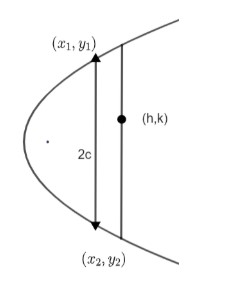Question
Question: In a parabola \[{{y}^{2}}=4ax\], find the locus of the poles of all chords of constant length 2c. ...
In a parabola y2=4ax, find the locus of the poles of all chords of constant length 2c.
(a) (y2−4ax)(y2+4c2)=4a2c2
(b) (y2−4ax)(y2+4a2)=8a2c2
(c) (y2−4ax)(y2+4c2)=2a2c2
(d) (y2−4ax)(y2+4a2)=4a2c2
Solution
Hint:At first consider a point (h, k) on the pole of the chord, the equation of polar be with repetition to parabola be yk=2a(x+h). Let that be intersect to parabola at (x1,y1) and (x2,y2). Assure the distance between (x1,y1) and (x2,y2) and equate it with 2c to get master equation. Then from parabola’s and polar equation find the relation between y1 and y2 and put it in the master equation.
Complete step-by-step answer:
In the question we are given a parabola y2=4ax and we have to find the locus of the poles of all the chords of constant length 2c.
Now we are given the equation of parabola which is y2=4ax.
Let’s suppose a point (h, k) is at the pole of the chord of length 2c.

So to find the equation of polar of (h, k) with respect to parabola is,
yk=2a(x+h)
Now we say that let the polar intersect at parabola at (x1,y1) and (x2,y2).
Also, we know that length of chord is constant that is 2c.
As the points (x1,y1) and (x2,y2) lie on parabola. So they should satisfy the equation of parabola y2=4ax. So, we can write, y12=4ax1 and y22=4ax2.
Hence, x1 is equal to 4ay12 and x2 is equal to 4ay22.
As the length of the chord is given as 2c and its end points are also known (x1,y1) and (x2,y2). So by using distance formula we can write,
(x1−x2)2+(y1−y2)2=c
So, now putting x1 as 4ay12 and x2 as 4ay22. So, we get,
(4ay12−4ay22)2+(y1−y2)2=2c
Now on squaring both the sides we get,
(4ay12−4ay22)2+(y1−y2)2=4c2
Now we know that, y12−y22 is (y1+y2)(y1−y2). So, we can write,
(4a)2(y1+y2)2(y1−y2)2+(y1−y2)2=4c2
Or, {{\left( {{y}_{1}}-{{y}_{2}} \right)}^{2}}\left\\{ \dfrac{{{\left( {{y}_{1}}+{{y}_{2}} \right)}^{2}}}{{{\left( 4a \right)}^{2}}}+1 \right\\}=4{{c}^{2}}
Let the above equation be considered as (i).
Now as we know that the equation of polar is yk=2a(x+h). We can rewrite the equation as,
x=2ayk−h
Now we will substitute x as 2ayk−h in the equation of parabola. So, we get,
y2=4ax=4a(2ayk−h)
So, y2=2yk−4ah
Hence, y2−2yk+4ah=0
In the equation the roots are y1 and y2. So, we can use the fact that the sum of the roots is equal to coefficient ofy2coefficient of y. Here co – efficient of y2 is 1 and that of y is -2k.
So, we can write that,
y1+y2=−(1−2k)=2k
Also, by the relation we can also say that product of roots is coefficient ofy2constant of the equation. Here constant is 4ah and co – efficient of y2 is 1.
So, y1y2=4ah
Now we know the value of y1+y2 and y1y2 which is 2k and 4ah respectively we can find value of (y1−y2)2 by using the relation that, (a−b)2=(a+b)2−4ab.
Here a is y1 and b is y2 so we get,
(y1−y2)2=(y1+y2)2−4y1y2
Now substituting y1+y2 as 2k and y1y2 as 4ah we get,
(y1−y2)2=(2k)2−4(4ah)
Or, (y1−y2)2=4k2−16ah
So, (y1−y2)2=4(k2−4ah)
Now let’s substitute value of y1+y2 as 2k and (y1−y2)2 as 4(k2−4ah) in the equation (i) so we get,
4(k2−4ah)(1+(4a2k)2)=4c2
Now on simplification we get,
(k2−4ah)(1+4a2k2)=c2
Hence on cross multiplication we get,
(k2−4ah)(4a2+k2)=4a2c2
Now putting back has x and k as y so we get,
(y2−4ax)(y2+4a2)=4a2c2
So, the correct option is (d).
Note: Student while forming the equation always compare the unknown value to the known values as we know the length of chords which was constant and compare it by the distance between variable (x1,y1) and (x2,y2) to form master equation.
